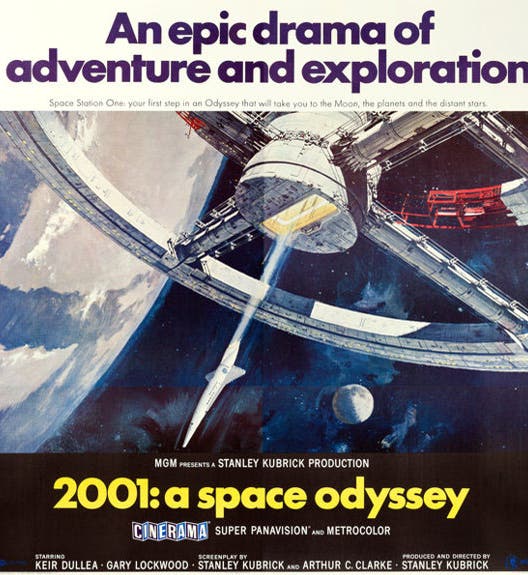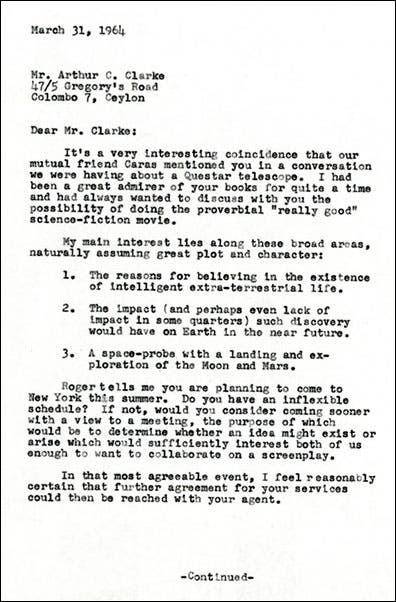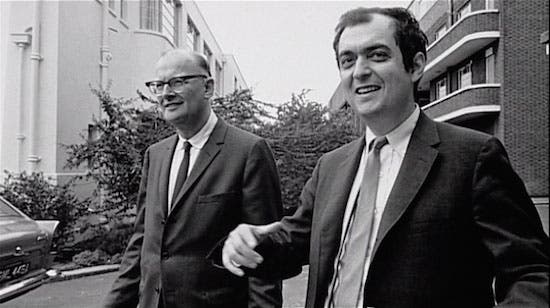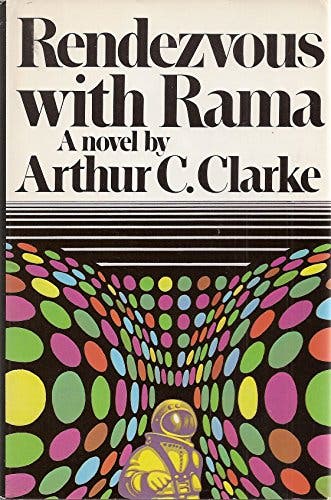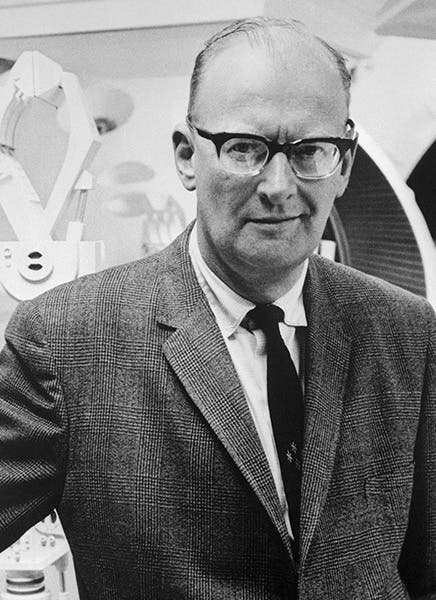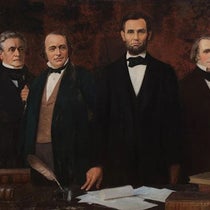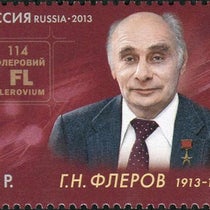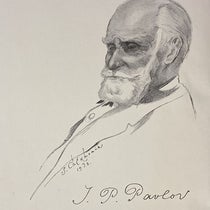Scientist of the Day - Arthur C. Clarke
Arthur C. Clarke, an English science fiction writer, was born Dec. 16, 1917. To older science fiction readers, Clarke is one of the big three of mid-20th-century SF writers, along with Isaac Asimov and Robert Heinlein, and his 1953 novel, Childhood's End, is one of the milestone novels of science fiction. To the more general public, Clarke is recognized for providing the inspiration and much of the content for Stanley Kubrick's film, 2001: A Space Odyssey (1968). Kubrick wrote Clarke a letter in 1964 (second image) in which he expressed interest in collaborating on a science fiction film, and the two met in New York City. Kubrick liked a short story "The Sentinel," that Clarke had published in 1950, and 2001 grew from that seed, although comparing "The Sentinel" and 2001 is rather like comparing a three-bar motif and a symphony. The motif is an alien artifact, a favorite theme for Clarke, who liked to examine how humanity would react in the face of something that clearly wasn't from around here.
2001 is commonly recognized as the first and still one of the greatest modern science fiction films, or the greatest SF film since Forbidden Planet (1956); we often forget that 2001 was widely panned and considered a failure when it first hit the theaters. Clarke himself burst into tears in disappointment when he premiered the movie. How things change! Clarke’s novel, 2001: A Space Odyssey, was written as the script was evolving, and was published a few months after the film debuted. It has sold millions of copies.
Another of Clarke’s more successful books was Rendezvous with Rama (1972). It too examined the impact on humanity of an alien artifact, in this case a 50-mile-long unmanned tubular habitat that passed through the solar system and was examined by the crew of a spaceship from Earth. The interior of the giant capsule rotated along its long axis to produce the feel of gravity, and it even had a large sea – the “cylindrical sea” – that ringed the inside and made access to the far end difficult. The attempt of the crew to understand what they were dealing with formed the essence of the plot, and I quite enjoyed reading it, many years ago.
Clarke wrote quite a few short stories – I have here on my desk his Collected Stories, a heavy paperback, 980 pages long, with 104 stories. Three of these are commonly ranked in the Top Twenty of all SF stories ever written: “The 9 Billion Names of God,” “The Star,” and “The Sentinel.” None of them really belongs in the top One Thousand, in my opinion. Each has a clever idea, but there is no character development whatsoever, and Clarke was not a gifted prose stylist. Modern SF authors like Ted Chiang or Cixin Liu can write circles around Clarke, with much better plots and character development as well. But Clarke was good at introducing new space concepts to the general public. He did not invent the idea of geosynchronous satellites, but he was the first to popularize them, in a non-fiction piece written in 1945. He did not invent the space elevator, but he was the first to write a novel (Fountains of Paradise, 1979) with a space elevator as a central plot element (a space elevator is a natural consequence of geosynchronous satellites, which hover above one spot on the Earth' surface; if one extended a thin strong cable from such a satellite down to the Earth, one could potentially lift objects into space without rockets). The science in Clarke’s science fiction was always good and provocative science, which is not always the case in that genre of fiction.
Clarke lived the last half of his life in Sri Lanka, where he moved from England in 1956. It is sometimes said that he moved there for the scuba diving (of which he was quite fond), but more likely the move came because of Sri Lanka's more tolerant attitude toward homosexuality, an attitude not at all reflected in Great Britain. Now doubt the harsh treatment afforded Alan Turing in 1954 suggested to Clarke that he needed to seek a more friendly environment. He was wise to do so.
Dec. 16 is a fine day for science fiction writer birthdays. Philip K. Dick was also born on Dec. 16; we celebrated his birthday just last year.
Dr. William B. Ashworth, Jr., Consultant for the History of Science, Linda Hall Library and Associate Professor emeritus, Department of History, University of Missouri-Kansas City. Comments or corrections are welcome; please direct to ashworthw@umkc.edu.

